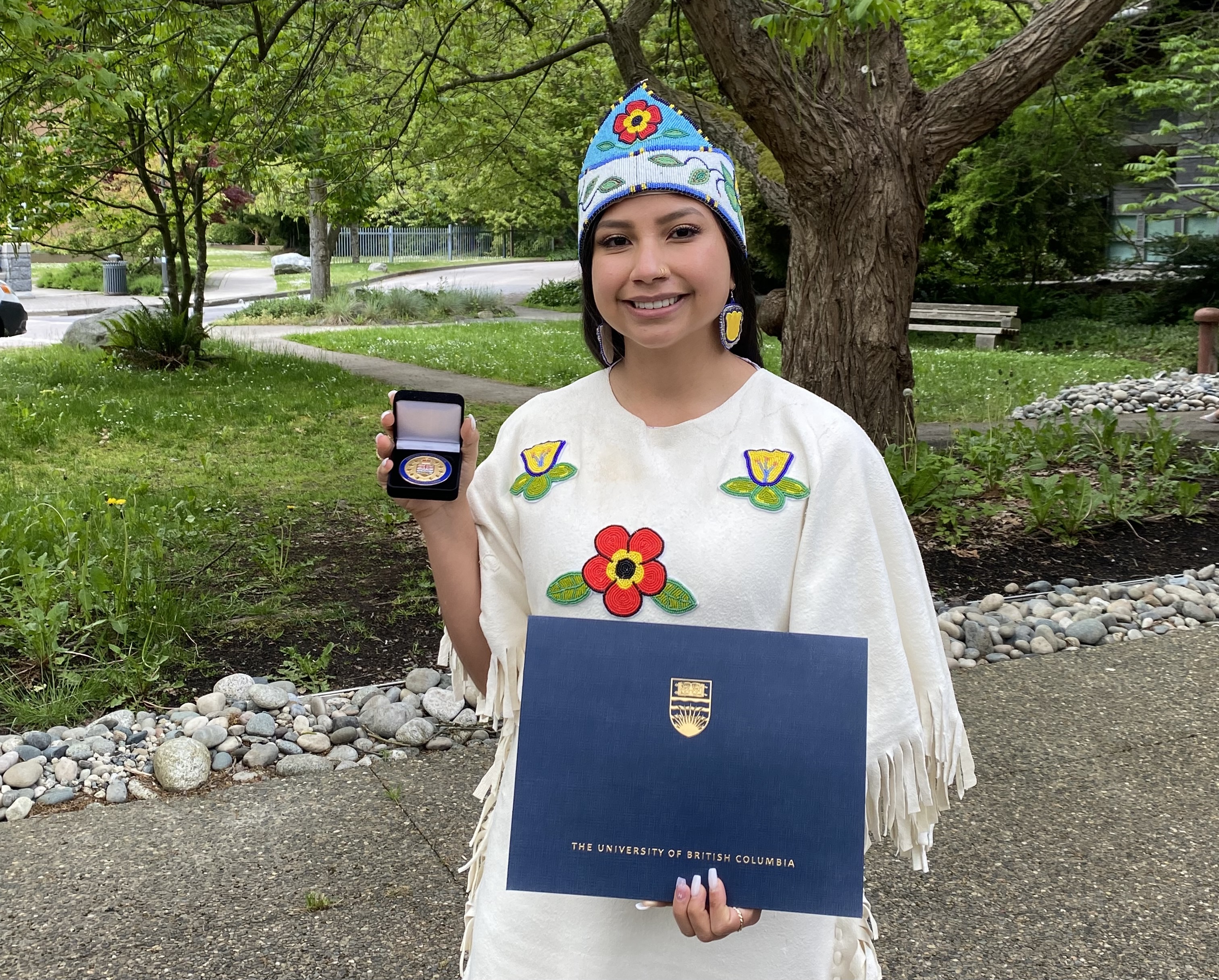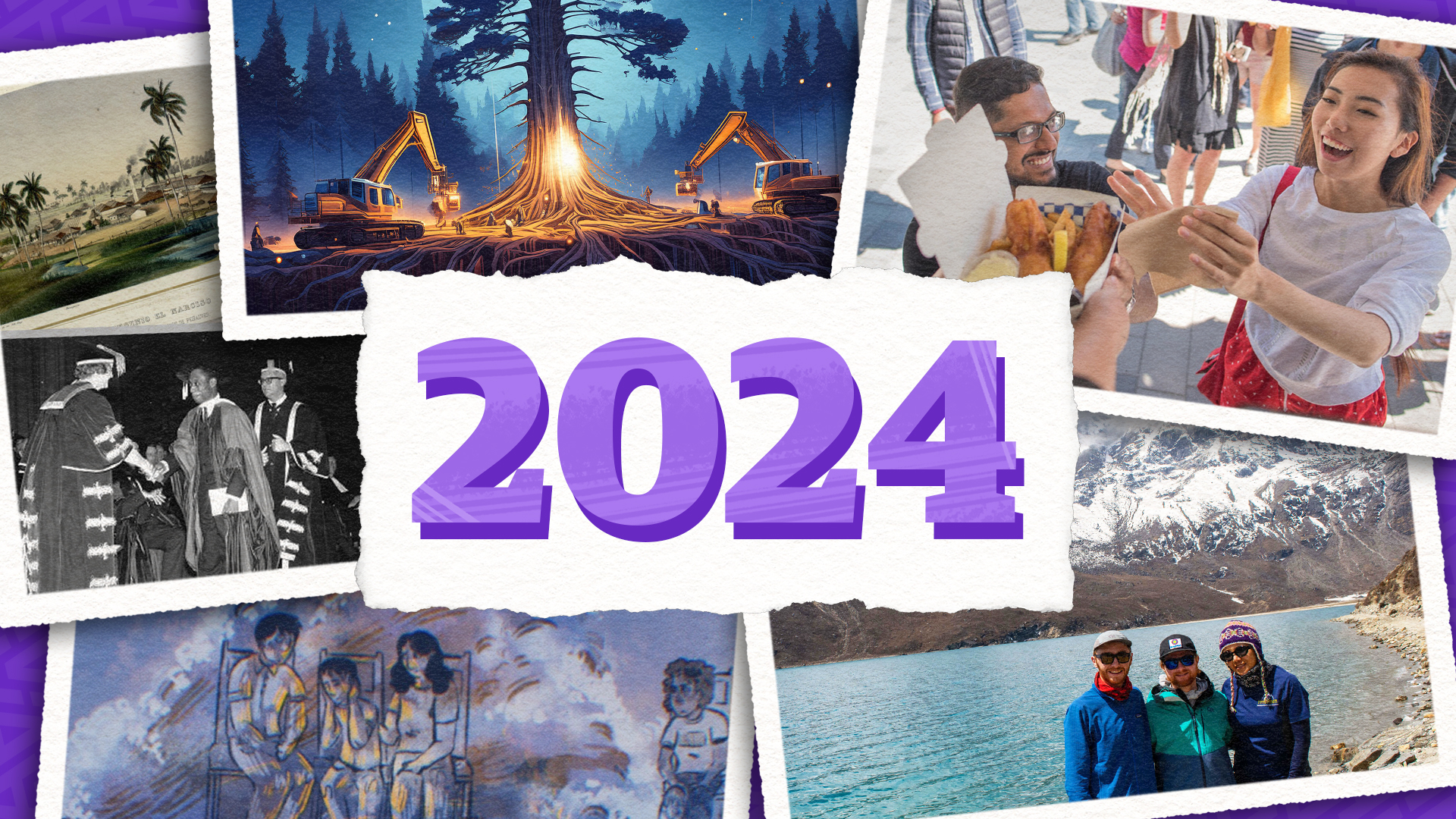

Aiyana Twigg, who graduated from UBC last week with a double major in First Nations and Endangered Languages and Anthropology, was awarded the 2022 Lieutenant Governor’s medal for inclusion, democracy and reconciliation.
In fall 2020, Aiyana Twigg was looking for a way to encourage her peers to engage with their language and history. She started an Instagram page called KtunaxaPride. “This page will be dedicated to teaching, learning, and talking about the Ktunaxa language, culture, history, territory, and worldview of who we are as Ktunaxanin̓tik,” she wrote in one of her first posts.
Although it was geared to her own community, she quickly gained followers from other Indigenous communities. Many reached out to tell her how much her page had inspired them to connect with their own languages.
“It became a space for people to connect and discuss and for them not to feel shame if they made a mistake,” she told CBC in a recent interview. “For non-Indigenous people, it encouraged them to learn about Indigenous people, culture and language.”
“This award is a symbol and recognition that we Indigenous people are breaking down colonial barriers, making change, and we are still here.”
Aiyana’s efforts to encourage language learning through social media is one of multiple ways she has been working to revitalize Indigenous languages. As part of her studies in First Nations and Endangered Languages and Anthropology, she worked with UBC anthropology professor Mark Turin to create online resources that empower Indigenous communities to create their own dictionaries. She has also helped to develop online games that encourage language learning.
Outside of her coursework, Aiyana made significant contributions to Indigenous student life as a lead facilitator with the Indigenous Leadership Collective, and as a Peer Advisor at Arts Indigenous Student Advising.
In recognition of her contributions to inclusion, democracy and reconciliation, Aiyana was awarded the 2022 Lieutenant Governor medal at her UBC graduation ceremony last week. “This award is a symbol and recognition that we Indigenous people are breaking down colonial barriers, making change, and we are still here,” she said.
Next year, Aiyana is participating in an intensive language immersion program through the First Peoples’ Cultural Council. She also plans to work on curriculum development with her community members, and finish a research project identifying gaps in the Ktunaxa writing system. She hopes to eventually continue her work with a masters in Indigenous language revitalization.
Earlier this year, Aiyana spoke to us about what she learned about herself at UBC, what advice she would give to incoming students, and what non-Indigenous people can do to be better allies.
What student leadership opportunity had the most impact on you during your time at UBC?
During my time at UBC, all of my leadership opportunities had a major impact on me, but I must say that being the Arts Indigenous Student Advising (AISA) peer advisor, as well as the main facilitator for the Indigenous Leadership Collective (ILC) had the most impact on me. While working as an AISA peer advisor and facilitator for the ILC, I was able to learn the importance of community and demonstrate and strengthen my own leadership skills, while also encouraging my fellow peers to do the same. I learned that I enjoy organizing events for students, while also attending those events to let my peers know that I am here to support them in any way I can. Although my position included creating a fun community rooted in leadership and laughter, it turned out that AISA, the ILC, the members, and staff were the ones who created that community for me.
What advice would you give to incoming UBC Arts students?
Don’t be afraid to find your community on campus and to reach out to others. Throughout your journey, community is important for establishing a support system during times when you feel down, overwhelmed, sad, or stressed. Do not feel ashamed to reach out to those when you are feeling this way. There are many programs that UBC offers, which can fit with your own values, beliefs, interests and are filled with others who feel the same way as you. Your feelings are valid and being a part of the various programs will help with ensuring your feelings are heard and that you are not alone.
What did you learn about yourself at UBC?
In my first year at UBC, I was very shy and timid. I was afraid to speak up for myself, voice my opinion, and accept my cultural identity, but since then, I have challenged myself through various leadership, school, and community opportunities, and through these experiences, I found the confidence to speak up, harness my voice, and be proud of who I am. I no longer feel afraid, but I actually feel excited and passionate to speak about the things I care about with a strong voice and my head held high.
What is one thing non-Indigenous people can do to be better allies?
One way non-Indigenous peoples can become better allies is by educating themselves on their local Indigenous community and the traditional territory they reside on. Each local community is different and has their own history, culture, and language that they can learn from.
Related links
- “UBC student wins Lieutenant-Governor medal for work on Indigenous language revitalization.” Terrace Standard, May 30, 2022.
- KtunaxaPride – Aiyana’s Instagram page
- Indigenous History Month Q&A with Aiyana Twigg
- Aiyana Twigg’s interview on CBC (starts at 53:33), May 25, 2022.
- Aiyana Twigg and Makena Zimmerman receive 2022 Outstanding Leader in the UBC Community Award, March 29, 2022.


